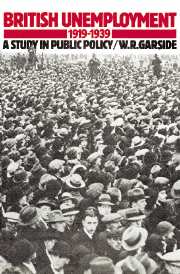Book contents
- Frontmatter
- Contents
- List of tables
- Preface
- Acknowledgements
- PART I INTRODUCTION
- PART II THE LABOUR MARKET UNDER STRAIN
- PART III THE INTERNATIONAL CONTEXT
- 5 On and off gold: unemployment, monetary policy and the exchange rate
- 6 Trade, tariffs and the stimulation of exports
- 7 Men, money and markets: the ‘Empire solution’ to unemployment, 1919–1931
- PART IV STRUCTURAL UNEMPLOYMENT, INDUSTRY AND THE REGIONS
- PART V MACROECONOMIC POLICY OPTIONS: THEORY AND PRACTICE
- Bibliography
- Index
7 - Men, money and markets: the ‘Empire solution’ to unemployment, 1919–1931
Published online by Cambridge University Press: 21 September 2009
- Frontmatter
- Contents
- List of tables
- Preface
- Acknowledgements
- PART I INTRODUCTION
- PART II THE LABOUR MARKET UNDER STRAIN
- PART III THE INTERNATIONAL CONTEXT
- 5 On and off gold: unemployment, monetary policy and the exchange rate
- 6 Trade, tariffs and the stimulation of exports
- 7 Men, money and markets: the ‘Empire solution’ to unemployment, 1919–1931
- PART IV STRUCTURAL UNEMPLOYMENT, INDUSTRY AND THE REGIONS
- PART V MACROECONOMIC POLICY OPTIONS: THEORY AND PRACTICE
- Bibliography
- Index
Summary
The search for immediate and practical responses to wartime demobilization – and more particularly to the rapid deterioration in unemployment after 1920 – introduced into the complex and protracted discussions of post-war imperial and Empire policy considerations of domestic economic problems which might not otherwise have achieved such prominence. This is not altogether surprising since the interruption of war had re-invigorated the ‘Empire visionaries’ and had emphasized afresh the desirability of securing the most appropriate and beneficial development of the Empire on political, economic and social grounds, to the mutual benefit of Britain and her associated territories.
We cannot do justice here to the vast detail and range of argument surrounding interwar imperialism. Specialist studies of the Empire are concerned principally with two problems: the management of nationalism in the Colonies and economic relations with the Dominions, centred on the Ottawa negotiations. Our present concern is more limited; namely, to examine the extent to which a growing preoccupation with and changing perception of the unemployment problem directly influenced the content, timing and likely success of policies towards emigration and colonial development.
ESCAPE FROM THE DOLE? EMIGRATION AND UNEMPLOYMENT
The marked reversal in official policy towards overseas migration after 1919 cannot be explained solely by the vicissitudes of employment.
- Type
- Chapter
- Information
- British Unemployment 1919–1939A Study in Public Policy, pp. 179 - 200Publisher: Cambridge University PressPrint publication year: 1990



